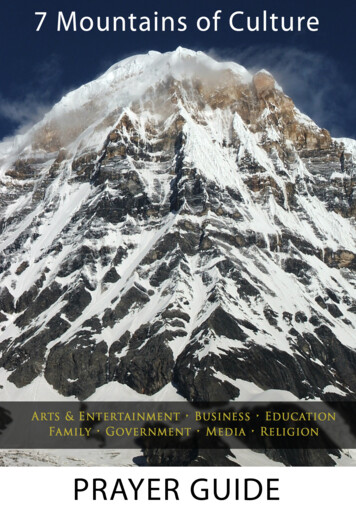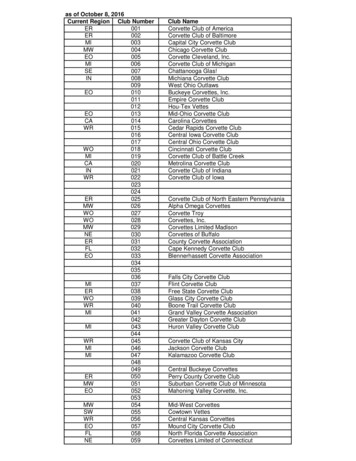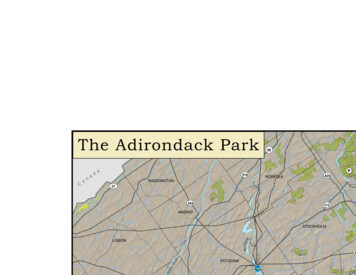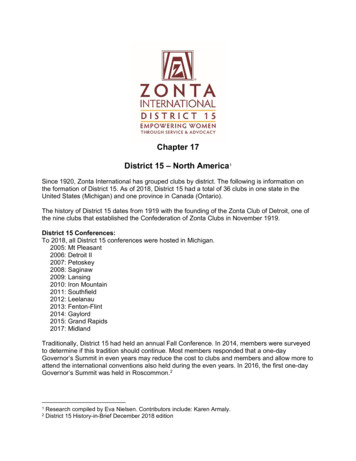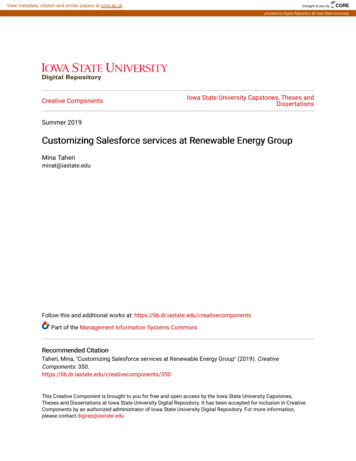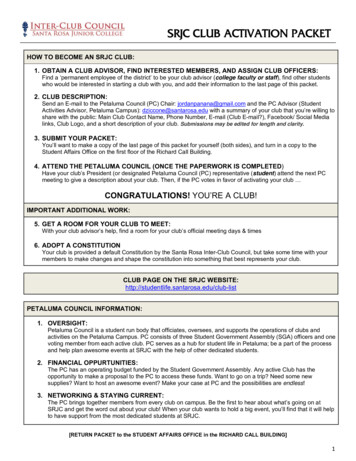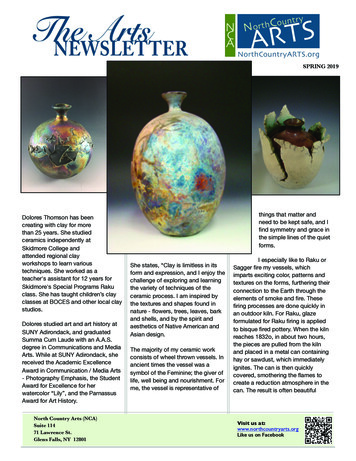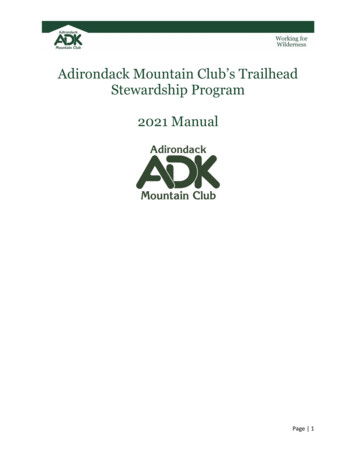
Transcription
Adirondack Mountain Club’s TrailheadStewardship Program2021 ManualPage 1
Table of ContentsPage 3 - ADK Background Info, Trailhead Stewardship Program MissionStatement, Who is an ADK Trailhead StewardPage 4 - Personal Safety, Physical Requirements, Host Benefits, EmergencyProtocolsPage 5 – Arrival, SchedulePage 6 – Schedule cont’d, Trailhead Steward ResponsibilitiesPage 7 – Trailhead Steward Responsibilities cont’d, Objective vs. SubjectiveInformationPage 8 – Trailhead Steward Responsibilities cont’d, Radio ProtocolPage 9 – Parking SpecificsPage 10 – Regulations and Other ConsiderationsPage 11 – Regulations and Other Considerations cont’d, Heart LakeProperty Rules, How to become an ADK Trailhead StewardPage 12 & 13 – Program EvaluationPage 14 – Trailhead Steward EvaluationADK’s Trailhead Stewardship Program manual is a valuable resource to this program. Copiescan be found at the Trailhead Steward campsite and the High Peaks Information Center (HPIC).Page 2
ADK Background InformationWho Are We?ADK (Adirondack Mountain Club) works to protect New York’s wild lands and waters bypromoting responsible outdoor recreation and building a statewide constituency of landstewardship advocates.ADK is the only nonprofit organization dedicated to protecting and advocating for New YorkState’s wild lands and waters while also teaching people how to enjoy natural places responsibly.Since 1922, the organization has offered people opportunities to stay and play in as well asprotect, discover, and explore the outdoors. For more information on membership or making adifference, head to www.adk.org or follow ADK on Instagram, YouTube, Facebook and Twitter.The Adirondack Mountain Club was founded in 1922 and is a member driven and directedorganization committed to public service and stewardship. The ADK Trailhead StewardshipProgram was created in 2017 (formerly known as the HPIC Host Program) in response to anincreasing number of visitors recreating from the Heart Lake Program Center. On average inJuly & August there are approximately 30,000 registered hikers at Heart Lake Program Centertrail heads. Recent trends show that weekends in September and October are busier thansummer days.Mission:Adirondack Mountain Club’s Trailhead Stewardship Program is dedicated to educating andinstilling an outdoor ethic in New York State recreationists through frontcountry outreach.Who is an ADK Trailhead Steward?An ADK Trailhead Steward is an educator and dedicated volunteer professional who enjoysengaging with the public to share their knowledge and assist visitors in having a safe andenjoyable outdoor experience. Trailhead Stewards must be at least 21 years of age and a currentmember of ADK. They will act as an onsite ambassador for ADK and share ADK’s mission withthe public, encouraging membership and involvement. These individuals must be comfortableworking in a fast paced environment sometimes in extreme weather conditions. Should havethorough knowledge of ADK & its facilities, common hiking trails, New York State Departmentof Environmental Conservation (DEC) regulations and Leave No Trace outdoor skills and ethics.ADK’s Trailhead Stewardship Program offers a service that allows you to spend a week greetingand engaging with our visitors about responsible recreation while sharing knowledge of ADK.The program offers a unique opportunity to educate visitors to The Heart Lake Program Centerto ensure a safe and enjoyable outdoor experience.Page 3
Personal Safety and Physical RequirementsThe importance of personal safety cannot be overstated. If there is a situation you areuncomfortable with when interacting with visitors, do not be afraid to remove yourself from thesituation. Then please tell the HPIC Manager or other HPIC staff about the situationimmediately. They will assist you in filling out an incident report form. It is also imperative thatyou are prepared with the proper equipment to handle the unpredictable and often extremeweather conditions in the Adirondacks. These conditions may include extreme, heat, cold,precipitation and insects. Please plan accordingly. This volunteer opportunity is very physicallydemanding. You will be on your feet the entire time and walking 2-3 miles a day in the HPICParking Lots. It can be a very intense and fast paced environment.Hosts Benefits:-A campsite for two people with a platform tent, picnic table, fireplace, fire wood, picnic sheltercover and sleeping cots, and an electric outlet-Use of certain specific ADK amenities, when available, such as canoes and kayaks-Three meals per day provided at the Adirondak Loj (Please notify us of any dietary restrictionsor food allergies prior to your arrival)-During your stay as host a twenty-five percent (25%) discount on all items sold at the HPICstore and Hungry Hiker food stand-An information package that includes: an ADK volunteer polo shirt, vest with name badge,campground and property maps, list of popular hikes in the area and DEC rules and regulationsEmergency ProtocolsIf you are witness to any property damage or a visitor approaches you to notify of an overdue,missing or injured hiker please notify an HPIC staff member immediately. In the case of anoverdue, missing or injured hiker and there is DEC personnel on property (a Forest Ranger orAssistant Forest Ranger) you can bring the reporting party to them directly. Otherwise pleasebring the reporting party into the HPIC to fill out an Incident Report Form with an HPIC staffmember. ADK is not a search and rescue organization and will leave all emergency response toDEC personnel.Page 4
ADK’s Trailhead Stewardship ProgramScheduleUpon your arrival:On your scheduled arrival date please check in at the HPIC with Bobby Clark (HPIC Manager)or Mary Dougherty (HPIC Assistant Manager). Please do not arrive earlier than 2pm to allowprevious steward a chance to pack up. At this time we will provide an additional overview ofstewarding responsibilities/schedule and meal schedule as well as answer any additionalquestions you might have and introduce you to the HPIC staff. We would be happy to give youanother brief property tour and help you get settled in!Daily SchedulePlease check-in every morning at the HPIC: 6:00am (weekends) and 6:30am (weekdays) to getthe radio, weather report and related information. You are welcome to eat leftovers from thestaff fridge at the Loj before your shift or can coordinate a hot breakfast break with HPIC staffbetween 7-8am.Throughout the morning you will park cars and count spots to help the Parking Booth staff fillthe lots to capacity. If any spaces open up please communicate as quickly and specifically aspossible with Parking Booth staff.Though your help managing the parking lots is very valuable to ADK and this program, your roleas an outdoor educator is even more so. Please allow folks a few minutes after parking beforeapproaching them but please attempt to interact with as many visitors as possible. Pleaseapproach visitors with a smile and a positive attitude while communicating by using theAuthority of the Resource technique (see hand outs). Despite trying to reach as many visitorswith this outreach it is important to have quality educational interactions with them. This willprove challenging as average interaction time is less than two and a half minutes. We arestriving to have every visitor interaction be positive, if this is not possible it is okay to walk away.If someone appears experienced and has proper gear you might spend less time with them aboutthose aspects of their trip and mention current weather and trail conditions. If someone appearsless experienced or like they do not have the appropriate gear you might want to spend moretime with them about those specifics. It is important to remember we are only there to informpeople about the decisions they are about to make. If after we talk about conditions, proper gear,regulations and people still want to do the Trap Dike in the pouring rain then we are not there tostop them. Please keep track of all engagements no matter how short with the hand counterprovided. If there are larger groups with overnight packs and there is DEC personnel in theparking lots, please defer these groups to them to prevent uniform fatigue. Please see pages nineand ten for more pertinent trail advice/regulations. If you have additional time while interactingwith visitors please share information about ADK such as membership, facilities and volunteeropportunities.Page 5
If it is a slow day and there aren’t many visitors to interact with please ask HPIC staff if there isanything additional you can help with, there usually is. Some of those quiet time responsibilitiesinclude removing cobwebs from exterior of building, trash pickups to ensure a pristineexperience and writing parking tickets for visitors who do not have a valid pass.At the end of your shift 12:30pm (weekdays) & 12:00pm (weekends) please check in with HPICstaff. We will put your radio back on the charger, ask for that days count and find out how yourday went. If you have any questions, comments or concerns we’d be happy to help or provideadditional training if necessary.For lunch you are welcome to eat leftovers in the staff dining room. You are also welcome to signup for a trail lunch at breakfast if you’d like to hit the trail following your shift. We encourageyou to get out and hike the trails, visit Lake Placid, paddle, or go for a swim in the afternoon!Dinner is served in the Adirondak Loj dining room at 6:15pmDeparture:Please make sure to leave the Trailhead Steward site clean when you leave and take all of yourbelongings. Please check out with HPIC staff after your last shift. This will allow us to do a quickdebrief and offer you your first opportunity for feedback. You will receive a Program EvaluationForm via email following your stay.ADK’s Trailhead Steward Responsibilities-A professional appearance and attitude when interacting with the public is of the utmostimportance.- Instill an outdoor ethic with visitors through positive educational interactions.-Personal contact is very important, both to help people feel welcome and to let them know youare there to help them. Make yourself available for any questions and feel comfortableapproaching visitors, but try not to overwhelm them immediately after they get out of theirvehicles.-Provide parking assistance: Ask drivers to park vehicles appropriately to maximize space, givedirections upon arrival as to where visitors should park, count empty spots before the lots filland as they open back up and communicate this with Parking Booth staff via your radio. It isextremely helpful to the Parking Booth staff to know which lot the spaces are opening up in sothey can direct the visitors accordingly.Page 6
-Encourage a visit into the HPIC. We’ve noticed that too few visitors actually stop into the HPICbefore their hike, often times missing out on important information pertinent to their plannedtrip. We encourage you to familiarize yourself with what we have to offer so you can better relaythis information to visitors. Let visitors know these services available at the HPIC and HungryHiker (bathrooms, water, snacks, gear & rentals). Provide directions to trailheads and otheramenities available to visitors.-Provide up to date weather and trail conditions. It is important to make hikers aware of anyexpected inclement weather conditions such as: extreme heat, cold, sun, precipitation, windspeeds, insects before they hit the trail. Depending on their destination it is also very helpful tolet visitors know of any specifically poor trail conditions such as: mud, ice, rotting snow, sectionsof trails that are washed out (Feldspar floating bog bridges) or sections of trail that may beimpassable due to water crossings (Indian Pass Brook on the way to Street and Nye Mountains).This information will allow visitors to make safe decisions while in the backcountry. If you areunsure of any up to date info on these topics, please defer to an HPIC staff member.-Educate the public on who ADK is and what we do. Many visitors to the Heart Lake ProgramCenter do not understand that this is private property and that we are different than DEC. Don’tbe afraid to encourage support through donations, membership and volunteer opportunities.-Provide quality backcountry education including Leave No Trace outdoor skills and ethics andDEC regulations specific to the Central High Peaks and other zones in the High Peaks Region topromote a safe and enjoyable outdoor experience.- Provide objective backcountry & trail information. It is of the utmost importance that wemake the distinction between objective and subjective information. How you conveyinformation to the public is nearly as critical as what you say. As a representative of ADK, thepublic will perceive you as an expert on backcountry information. Therefore, the informationyou give will be trusted and expected to be accurate. This means the information you give mustbe accurate for everyone, no matter what his or her individual capabilities.Objective information is that which can be measured and will be the same for every person.Examples of this type of information are distance in miles, weather conditions in terms ofcurrent temperature and precipitation, and elevation gain of a particular trail. Providingobjective information will let each hiker make accurate judgments based upon their ownpersonal capabilities. Remember that we do not under any circumstances give or verify timeestimates.Subjective information is that which will vary depending on the individual concerned.Examples of this are: how much time a trip will take, how hard or easy a trail is, can the hike becompleted by dark, and what is the weather going to be like. The individual hiker is the only onewho can accurately judge the time it will take to complete the hike. Information on trailconditions gathered from other hikers is anecdotal to that person’s experience and should onlybe relayed with that caution. You will receive current weather forecasts each morning for lowerand higher elevations, but Adirondack weather is very unpredictable and individuals should beprepared for the unexpected.Page 7
As the experts that the public will seek out for answers, Trailhead Stewards need to be verycareful about giving out information that might not be applicable to that particular person. Thepotential for that person getting into trouble out on the trail is increased dramatically if they areprovided subjective information that might not necessarily be true for them. The main focusof ADK’s Trailhead Stewardship Program is to provide objective information that is as accurateas possible and avoids misleading someone into attempting to complete a trip that is out of theirability range. By receiving objective information, each recreational user passing through theHeart Lake Program Center will have the tools to make safe and accurate backcountryjudgments. If you don’t know something, don’t make it up! Find someone that would know theanswer. It’s okay not to know everything.- When parking lots are full it is often helpful to assist with turning cars away in front of theparking booth and providing alternate hike/trailhead options. It is easier to help with this andcontinue to manage the lots with two Stewards.-If it is a slow day, please ask Information Center Staff if there is any additional way you canhelp. Other occasional responsibilities include removing cobwebs from exterior of building,trash pickups to ensure a pristine experience and writing parking tickets for visitors who do nothave a valid pass.Radio Protocol-The yellow or camouflage Motorola radios should be used for communication between theTrailhead Steward, the parking booth attendant and staff inside the HPIC.-Please hold down the button on the side of the radio 3 seconds before you start speaking andfor 3 seconds after you finish, avoiding being cut off.-Identify yourself first and then who you are speaking to. Please keep messages short andconcise. On busy days it might take booth staff a minute to respond so please be patient.-It is of the utmost importance to use appropriate and professional language when talking overthe radios because visitors may be able to hear you.-Please be sure to put the radio back in the charging dock inside the HPIC after you are donehosting for the day.Page 8
Parking SpecificsParking RatesFull Day 7Half Day(after1pm) 3Week*Member 28Nonmember 15 7 60Local 7 3 28*Only extended to groups who are going into the woods for a backpacking trip, not for peoplewho will be leaving the property and returning a different day. We do not reserve parkingspaces.Local rates extended to residents of:Lake PlacidSaranac LakePaul SmithsKeeneSt HubertsKeene ValleyTupper LakeAusable ForksJay-No buses, RVs or trailers! (short buses okay)-The only people allowed to park at the Loj are Loj guests, guests participating in a schedulededucation program or staff members. The only guests allowed to park in the campground lotsare campground guests. Locals and Members who are not overnight property guests must parkin the hiker parking lots, NO EXCEPTIONS!-Cars are not allowed to “wait for a spot”. They may park in the snowplow turn aroundtemporarily ( 20 minutes) to drop people off or stop into the HPIC to rent equipment, makepurchases or use the restrooms but must move to overflow parking or another trailhead whenfinished.-People are not allowed to sleep in their cars or camp in the parking lots. We are unable to allowvisitors to sleep in their vehicles due to Department of Health regulations. Free camping ispermitted on Meadows Lane (remind them that no fires are allowed).-Visitors with a season parking pass do not need to pay for parking but must park in the hikerparking lots if there is space available.-Overflow parking is permitted 1 mile down the road “on or past Meadows Lane” which is about1 mile from the HPIC, meaning cars can park all the way down Meadows Lane (only on one side)or on the right side of Adirondack Loj Rd from Meadows Lane towards Route 73. Visitors cannotpark between the “no parking” signs on either side of the road between the parking booth andMeadows Lane; otherwise they will receive a parking ticket. There is also absolutely no parkingallowed at the bridge pull off between the parking booth and Meadows Lane. Please stress theimportance of safety when discussing overflow parking and walking on the road back up to thetrailhead. Personal safety is more important than parking somewhere illegal because you don’tmind paying for a ticket. Encourage visitors walking from overflow parking back up to thetrailhead to walk single file facing oncoming traffic as far off the road as possible.Page 9
Primary Regulations and Considerations for Eastern High PeaksWildernessFood Storage-Bear Canisters are required for all overnight users in the Eastern High Peaks between April 1 stand November 30th and are strongly encouraged in areas where they are not required. It must bea commercially manufactured Bear Canister (Blue Bear Vault and Orange FrontiersmanCanisters DO NOT work in this area. We offer a free rental of an HPIC bear canister for thosewho come in to show us their bear vault or frontiersman canister)-All scented objects must be in there: toiletries, medications, food, garbage, etc-Avoid cooking at dawn or dusk and cook 150ft away from where you are sleeping (roughly 70large steps)-Store on the ground 150ft away from where you are staying, away from water sources, cliffs,and other people’s tent sites. Do not keep anything strapped to it during the night-We rent them for 8.00 for 1-2 nights and goes up by 8 for every 2 nights after.Group Size-Overnight group size is limited to a maximum of 8 people(over sized groups must camp at least one mile apart)-Day use group size is limited to a maximum of 15 people(over sized groups must remain at least one mile apart at all times, they cannot meet up as onelarge group at their destination or at any time)Camping-Camping must be done at designated tent and lean-to sites, no pristine camping-No Camping above 3500 ft except at designated sites-No more than 8 people or 3 tents allowed per tent site (hammocks are considered a tent andmust be at a designated tent camping site)-No tents allowed in lean-tos or at lean-to sites-Tents must be within 15 ft of the DEC marker for a designated tent site-If you arrive at a lean-to or tent camping site that is not at capacity, other visitors cannot refuseyou the opportunity to stay thereCampfires-No campfires allowed in the Eastern High Peaks. All cooking must be done on a backpackingstove. Stoves that burn any organic material as fuel cannot be used (biolite, charcoal, etc.).Miscellaneous-Pets must be leashed and under control at all times-No soap or disposal of food in any water body-No use of any motorized equipment: drones, atv’s, chainsaws, etc.Page 10
-Hikers must register at every trail register box they pass, even if they are not returning thesame way-Quiet hours must be observed from 10pm – 7am-Use existing outhouses or deposit human waste in catholes dug 6-8 inches deep and at least150ft from any trail or water body-Summit weather conditions can be more severe than at the trailhead-A cell phone is not a replacement for a map (navigation source) or headlamp (light source)-Encourage visitors to have a dedicated light source and set a turnaround timeHeart Lake Property Rules(Loj and Campground guests)-Only overnight property guests can swim in Heart Lake due to Department of Healthregulations.-Overnight property guests and visiting ADK members may rent boats on Heart Lake. ADKMembers who are just here for the day get the discounted rate of 7 per hour and the regularrate is 10 per hour.- All guests must sign in at the front desk before swimming, boating or fishing- Quiet Hours are strictly enforced from 10pm-7am. Radios are not permitted- All guests must bring their trash and recycling to designated trash and recycling areas beforedark. All other food items must be stored in vehicle with windows rolled upHow Do I Become An ADK Trailhead Steward?You can become a trailhead steward by contacting Bobby Clark, HPIC Manager, at 518-5233480 ext 122 or email bclark@adk.org to request an application. If you need to change or cancelyour scheduled time please contact Bobby Clark, HPIC Manager, as far before your scheduledassignment as you are able.Page 11
Adirondack Mountain Club’s Trailhead Stewardship ProgramEvaluationCompleted by the VolunteerWe appreciate the information you provide as an ADK Trailhead Steward. Your feedback is animportant part of the continued effort to improve the program. You may remain anonymous oryou may sign your name.Name:Date:1. How was the information and training provided to you upon arrival?ExcellentAdequateNeeds improvement2. To what extent do you feel you were accepted by the Loj staff (front desk and Loj Crew)?well acceptedgenerally well accepted, some exceptionsmixed receptionnot well3. To what extent do you feel you were accepted by the HPIC staff?well acceptedgenerally well accepted, some exceptionsmixed receptionnot well4. What is the best and the worst hosting experience you have had while volunteering this weekat ADK?Best:Worst:5. How did you hear about ADK’s Trailhead Stewardship Program?6. Would you participate in this program again?Page 12
7. What improvements could be made to this program?8. Please add any additional suggestions or comments:Please return the evaluation to Bobby Clark, HPIC Manager, at PO Box 867, Lake Placid, NY12946 or bclark@adk.orgPage 13
ADK Trailhead Steward EvaluationCompleted by the HPIC ManagerA review of ADK staff interaction with the host to be shared with the ADK TrailheadStewardship Program Volunteer Coordinator to better evaluate the performance andeffectiveness of the trailhead steward.Name:Date:1. Was this person a returning trailhead steward or a new trailhead steward?2. Did the trailhead steward arrive and depart as scheduled?3. Did the trailhead steward perform the necessary duties?yes, every day mostly, w/some exceptionsconsistentsome days, but not4. Did the trailhead steward seem to understand the responsibilities and the mission of theprogram?yes, definitely yes, for the most partnot really5. How would you rate the enthusiasm of the trailhead steward? (5 being the most, 1 being theleast) circle one543216. Was there any feedback (positive or negative) from guests or staff regarding the trailheadsteward?7. Please add any additional comments:Page 14
Page 15
questions you might have and introduce you to the HPIC staff. We would be happy to give you another brief property tour and help you get settled in! Daily Schedule Please check-in every morning at the HPIC: 6:00am (weekends) and 6:30am (weekdays) to get the radio, weather report and related information. You are welcome to eat leftovers from the
